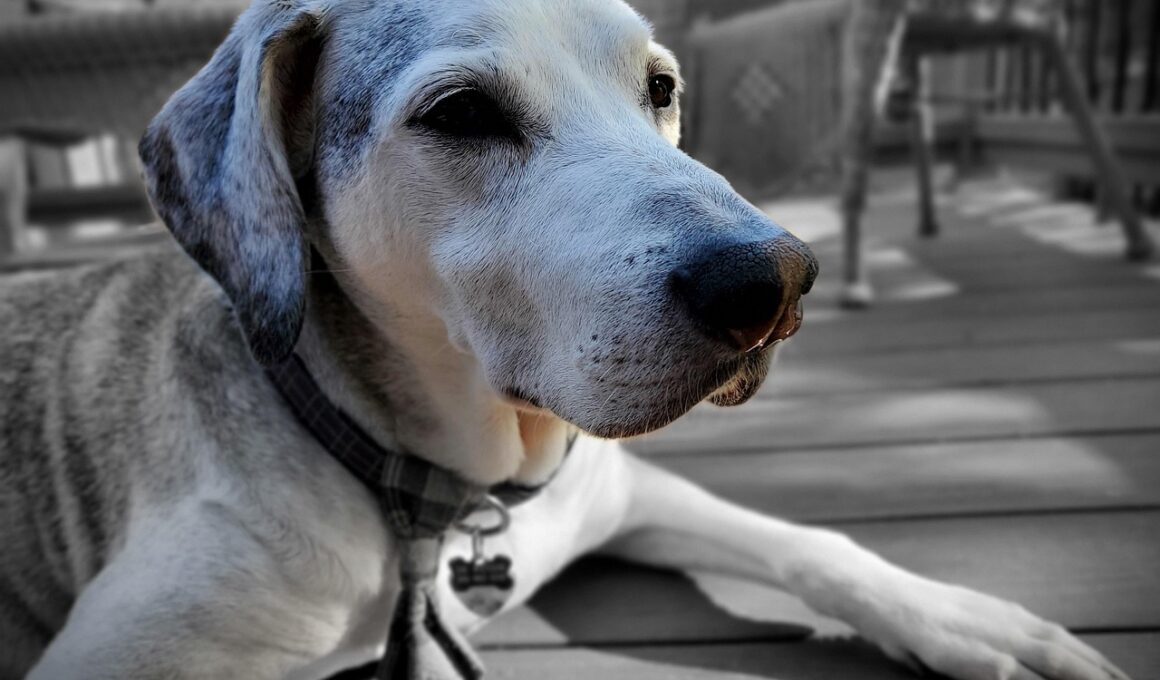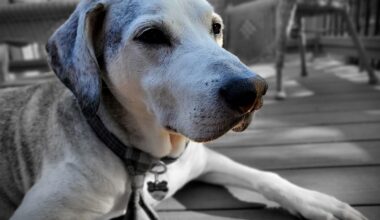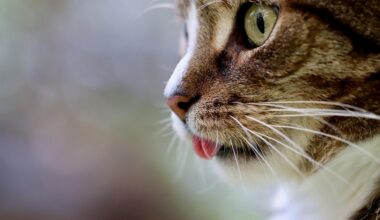How Vaccinations Protect Older Dogs from Disease
As dogs age, their immune systems weaken, putting them at risk for a variety of diseases. Vaccinations play a crucial role in maintaining the health of senior dogs. They not only protect against common illnesses but also enhance their overall well-being. It’s essential to keep up with vaccinations even in older pets, as their bodies respond differently than younger dogs. Diseases like parvovirus, distemper, and rabies can have severe repercussions for older dogs, leading to long-term health issues or even death. Regular check-ups with a vet can help determine which vaccines are necessary based on age and health conditions. Vaccination schedules should be adjusted based on lifestyle and health assessments. For example, dogs that are frequently around other animals may require different vaccines than those that are less social. Owners must be proactive in consulting with their veterinarian about their dog’s vaccination needs. Ensuring proper vaccinations not only keeps older pets healthier, but it also prolongs their lives, allowing them more time to enjoy being part of the family.
Many dog owners may consider that their older dogs are past the need for vaccinations, but this is a misconception. Vaccines not only safeguard against harmful diseases but also help in building immunity in aging dogs. Senior dogs can face health challenges that younger dogs may not. For instance, older dogs often require additional care and immune support as they are more susceptible to infections and diseases. Vaccinations can boost their immune response and help them combat illnesses effectively. Avoiding vaccinations can lead to significant health challenges in senior dogs. Potentially preventable diseases can lead to complications that might otherwise have been avoided. Owners should be observant of their older pets and regularly communicate with veterinary professionals about any changes in health or behavior. Healthy diets and vaccinations go hand in hand for ensuring long-term health. Nutrition combined with regular vaccinations provides a comprehensive approach to caring for senior dogs. This proactive approach significantly enhances the quality of life and ensures dogs remain lively and active well into their golden years.
The Importance of Tailored Vaccination Plans
Every senior dog is unique, and their vaccination plans should be tailored accordingly. Factors such as breed, size, underlying health conditions, and lifestyle significantly influence what vaccinations are essential. For example, a senior dog that is frequently exposed to other dogs at dog parks may require vaccines outside the basic ones recommended for all dogs. Additionally, dogs with chronic health conditions might need specialized vaccines. Hence, working closely with a veterinarian becomes essential to formulate a vaccination schedule that suits each dog’s individual needs. Annual or biannual wellness exams will help ensure that the specific health requirements for older dogs are addressed. Owners should be prepared to share the dog’s medical history and lifestyle with the vet. This open dialogue will help in determining any necessary vaccinations that may not be obvious at first glance. Regular assessments will also help identify possible side effects or reactions to vaccines, ensuring that the dog receives the most effective and safe care. Adjustments to vaccination schedules may be necessary based on the dog’s evolving health status.
While vaccinations are crucial for protecting senior dogs, owners should also be mindful of the possible side effects. Some dogs might experience mild reactions to vaccines, such as soreness, swelling, or lethargy. These effects are generally temporary and should resolve within a day or two. However, in rare instances, severe allergic reactions can occur, necessitating immediate veterinary attention. It’s vital for dog owners to monitor their pets post-vaccination and contact their veterinarian if any unusual symptoms emerge. This vigilance ensures any serious complications are addressed promptly, allowing the pet to recover swiftly. Conversely, the risks of not vaccinating far outweigh the potential side effects associated with vaccination. The dangers posed by preventable diseases could have devastating impacts on an older dog’s health. Adequate communication with veterinary professionals about any concerns regarding vaccines can provide peace of mind for owners. Vaccinating an aging dog may seem daunting at times, but the long-term benefits significantly increase their chances of leading a vibrant and healthy life. Therefore, prioritizing vaccinations should be a staple in an older dog’s health care routine.
Additional Care Beyond Vaccinations
Dog vaccinations are just one part of a comprehensive health strategy for senior dogs. In addition to keeping up with vaccinations, pet owners must also ensure their dogs receive regular exercise, a balanced diet, and appropriate dental care. Routine physical activity is essential in maintaining a healthy weight and preventing obesity-related issues that can complicate health. Senior dogs may have different exercise requirements compared to younger counterparts. Therefore, tailored exercise routines should be developed to keep them active without overexertion. Nutritional choices also play a critical role in an older dog’s health. Owners should provide high-quality dog food specially formulated for seniors, as this contains the necessary nutrients for their age group. Furthermore, dental disease is prevalent in older dogs, leading to various health complications. Regular dental check-ups, along with daily tooth brushing, can promote better oral health and overall wellness. The integration of vaccinations with these comprehensive care measures ensures the best quality of life for senior pets, allowing them to enjoy their golden years to the fullest.
As a responsible pet owner, ensuring that your senior dog remains healthy requires commitment and knowledge. Staying informed about the changes in vaccination protocols, especially regarding senior dogs, is key. It is equally important to ensure that the vet you work with is well-versed in the needs of aging dogs and can provide adequate recommendations tailored to your pet. Regularly updating vaccination records helps avoid lapses in vaccination schedules. Additionally, building a support system through community resources, such as local pet health classes and online pet care forums, can empower owners with valuable information. These resources often provide insights into best practices for senior dog care and can assist with navigating the health care journey efficiently. Owners sharing their experiences can create a network of support, offering encouragement in caring for aging pets. Recognizing symptoms of health issues early on can lead to early interventions, ultimately improving the prognosis. Devoting time to learning and adapting care techniques not only fosters a healthier environment for older dogs but also strengthens the bond between pet and owner significantly.
Conclusion
In conclusion, vaccinations for senior dogs are essential to protect them from preventable diseases while also supporting their fragile immune systems. By tailoring vaccination plans, closely monitoring their health, and ensuring a balanced lifestyle, pet owners can dramatically improve their senior dogs’ quality of life. Regular veterinary visits should remain a priority to assess health changes, address vaccines needed, and adjust care plans. These simple yet effective measures can lead to longer, healthier lives for older dogs, allowing for more fond memories and cherished moments together. The care an owner provides during their pet’s senior years greatly contributes to their overall happiness and vitality. An engaged and informed approach towards pet health ensures that senior dogs become active participants in family life as they age. Remember, safeguarding against diseases through vaccination is a powerful means of expressing love for your dog. Prioritizing veterinary care not only preserves their health but also celebrates the beautiful bond shared between pet and owner. Ultimately, investing time to understand their needs results in a loving environment where senior dogs thrive.
This is an additional placeholder paragraph to add structure to the response.


